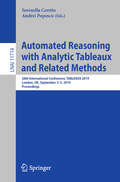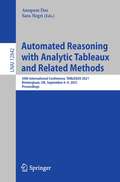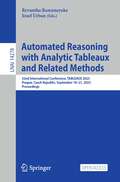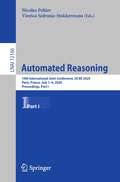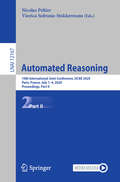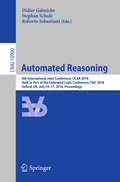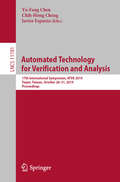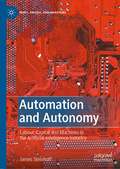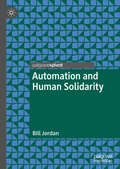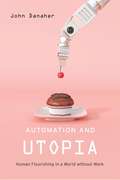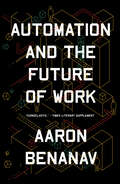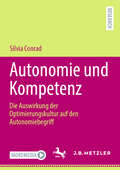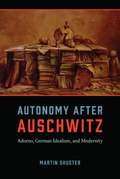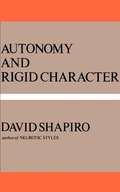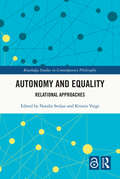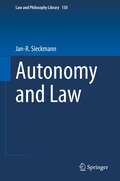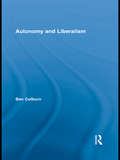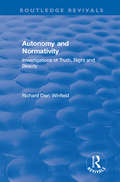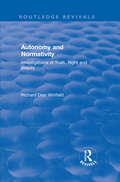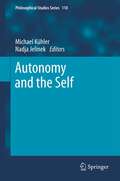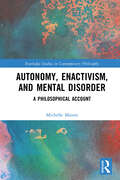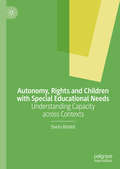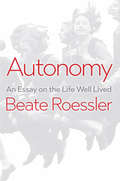- Table View
- List View
Automated Reasoning with Analytic Tableaux and Related Methods: 28th International Conference, TABLEAUX 2019, London, UK, September 3-5, 2019, Proceedings (Lecture Notes in Computer Science #11714)
by Serenella Cerrito Andrei PopescuThis book constitutes the proceedings of the 28th International Conference on Automated Reasoning with Analytic Tableaux and Related Methods, TABLEAUX 2019, held in London, UK, in September 2019, colocated with the 12th International Symposium on Frontiers on Combining Systems, FroCoS 2019. The 25 full papers presented were carefully reviewed and selected from 43 submissions.They present research on all aspects of the mechanization of tableaux-based reasoning and related methods, including theoretical foundations, implementation techniques, systems development and applications. The papers are organized in the following topical sections: tableau calculi, sequent calculi, semantics and combinatorial proofs, non-wellfounded proof systems, automated theorem provers, and logics for program or system verification.
Automated Reasoning with Analytic Tableaux and Related Methods: 30th International Conference, TABLEAUX 2021, Birmingham, UK, September 6–9, 2021, Proceedings (Lecture Notes in Computer Science #12842)
by Sara Negri Anupam DasThis book constitutes the proceedings of the 30th International Conference on Automated Reasoning with Analytic Tableaux and Related Methods, TABLEAUX 2021, held in Birmingham, UK, in September 2021.The 23 full papers and 3 system descriptions included in the volume were carefully reviewed and selected from 46 submissions.They present research on all aspects of the mechanization of tableaux-based reasoning and related methods, including theoretical foundations, implementation techniques, systems development and applications. The papers are organized in the following topical sections: tableau calculi, sequent calculi, theorem proving, formalized proofs, non-wellfounded proofs, automated theorem provers, and intuitionistic modal logics.
Automated Reasoning with Analytic Tableaux and Related Methods: 32nd International Conference, TABLEAUX 2023, Prague, Czech Republic, September 18–21, 2023, Proceedings (Lecture Notes in Computer Science #14278)
by Josef Urban Revantha RamanayakeThis open access book constitutes the proceedings of the proceedings of the 32nd International Conference on Automated Reasoning with Analytic Tableaux and Related Methods, TABLEAUX 2023, held in Prague, Czech Republic, during September 18-21, 2023. The 20 full papers and 5 short papers included in this book together with 5 abstracts of invited talks were carefully reviewed and selected from 43 submissions. They present research on all aspects of the mechanization of reasoning with tableaux and related methods. The papers are organized in the following topical sections: tableau calculi; sequent calculi; theorem proving; non-wellfounded proofs; modal logics; linear logic and MV-algebras; separation logic; and first-order logics.
Automated Reasoning: 10th International Joint Conference, IJCAR 2020, Paris, France, July 1–4, 2020, Proceedings, Part I (Lecture Notes in Computer Science #12166)
by Nicolas Peltier Viorica Sofronie-StokkermansThis two-volume set LNAI 12166 and 12167 constitutes the refereed proceedings of the 10th International Joint Conference on Automated Reasoning, IJCAR 2020, held in Paris, France, in July 2020.* In 2020, IJCAR was a merger of the following leading events, namely CADE (International Conference on Automated Deduction), FroCoS (International Symposium on Frontiers of Combining Systems), ITP (International Conference on Interactive Theorem Proving), and TABLEAUX (International Conference on Analytic Tableaux and Related Methods).The 46 full research papers, 5 short papers, and 11 system descriptions presented together with two invited talks were carefully reviewed and selected from 150 submissions. The papers focus on the following topics: Part I: SAT; SMT and QBF; decision procedures and combination of theories; superposition; proof procedures; non classical logics Part II: interactive theorem proving/ HOL; formalizations; verification; reasoning systems and tools*The conference was held virtually due to the COVID-19 pandemic. Chapter ‘Constructive Hybrid Games’ is available open access under a Creative Commons Attribution 4.0 International License via link.springer.com.
Automated Reasoning: 10th International Joint Conference, IJCAR 2020, Paris, France, July 1–4, 2020, Proceedings, Part II (Lecture Notes in Computer Science #12167)
by Nicolas Peltier Viorica Sofronie-StokkermansThis two-volume set LNAI 12166 and 12167 constitutes the refereed proceedings of the 10th International Joint Conference on Automated Reasoning, IJCAR 2020, held in Paris, France, in July 2020.* In 2020, IJCAR was a merger of the following leading events, namely CADE (International Conference on Automated Deduction), FroCoS (International Symposium on Frontiers of Combining Systems), ITP (International Conference on Interactive Theorem Proving), and TABLEAUX (International Conference on Analytic Tableaux and Related Methods).The 46 full research papers, 5 short papers, and 11 system descriptions presented together with two invited talks were carefully reviewed and selected from 150 submissions. The papers focus on the following topics:Part I: SAT; SMT and QBF; decision procedures and combination of theories; superposition; proof procedures; non classical logicsPart II: interactive theorem proving/ HOL; formalizations; verification; reasoning systems and tools*The conference was held virtually due to the COVID-19 pandemic. Chapter ‘A Fast Verified Liveness Analysis in SSA Form’ is available open access under a Creative Commons Attribution 4.0 International License via link.springer.com.
Automated Reasoning: 9th International Joint Conference, IJCAR 2018, Held as Part of the Federated Logic Conference, FloC 2018, Oxford, UK, July 14-17, 2018, Proceedings (Lecture Notes in Computer Science #10900)
by Stephan Schulz Didier Galmiche Roberto SebastianiThis book constitutes the refereed proceedings of the 9th International Joint Conference on Automated Reasoning, IJCAR 2018, held in Oxford, United Kingdom, in July 2018, as part of the Federated Logic Conference, FLoC 2018. In 2018, IJCAR unites CADE, TABLEAUX, and FroCoS, the International Symposium on Frontiers of Combining Systems, and, for the fourth time, is part of the Federated Logic Conference.The 38 revised full research papers and 8 system descriptions presented together with two invited talks were carefully reviewed and selected from 108 submissions. The papers focus on topics such as logics, deductive systems, proof-search methods, theorem proving, model checking, verification, formal methods, and program analysis.
Automated Technology for Verification and Analysis: 17th International Symposium, ATVA 2019, Taipei, Taiwan, October 28–31, 2019, Proceedings (Lecture Notes in Computer Science #11781)
by Javier Esparza Yu-Fang Chen Chih-Hong ChengThis book constitutes the refereed proceedings of the 17th International Symposium on Automated Technology for Verification and Analysis, ATVA 2019, held in Taipei, Taiwan in October 2019.The 24 regular papers presented together with 3 tool papers were carefully reviewed and selected from 65 submissions. The symposium is dedicated to the promotion of research on theoretical and practical aspects of automated analysis, verification and synthesis by providing a forum for interaction between the regional and the international research communities and industry in the field. The papers focus on cyber-physical systems; runtime techniques; testing; automata; synthesis; stochastic systems and model checking.
Automation and Autonomy: Labour, Capital and Machines in the Artificial Intelligence Industry (Marx, Engels, and Marxisms)
by James SteinhoffThis book argues that Marxist theory is essential for understanding the contemporary industrialization of the form of artificial intelligence (AI) called machine learning. It includes a political economic history of AI, tracking how it went from a fringe research interest for a handful of scientists in the 1950s to a centerpiece of cybernetic capital fifty years later. It also includes a political economic study of the scale, scope and dynamics of the contemporary AI industry as well as a labour process analysis of commercial machine learning software production, based on interviews with workers and management in AI companies around the world, ranging from tiny startups to giant technology firms. On the basis of this study, Steinhoff develops a Marxist analysis to argue that the popular theory of immaterial labour, which holds that information technologies increase the autonomy of workers from capital, tending towards a post-capitalist economy, does not adequately describe the situation of high-tech digital labour today. In the AI industry, digital labour remains firmly under the control of capital. Steinhoff argues that theories discerning therein an emergent autonomy of labour are in fact witnessing labour’s increasing automation.
Automation and Human Solidarity
by Bill JordanThis book provides a detailed analysis of the economic and political implications of the introduction of Artificial Intelligence and Robotics into the service sector of economies that have so far relied on service jobs to sustain levels of employment. It examines how reliance on coercive measures for enforcing low-paid service work attempts to postpone this third Industrial Revolution, and analyses the struggles that must still take place if we are to achieve a future of freedom and social justice for all. While automation and globalisation have made human solidarities of traditional kinds more difficult to sustain, they have also made new kinds possible. Experiments in social policy, and especially the pilot projects with unconditional Universal Basic Incomes, offer a possible model for a new kind of society. The author argues that it is politics which will determine whether we can achieve these new human solidarities.
Automation and Utopia: Human Flourishing in a World without Work
by John DanaherAutomating technologies threaten to usher in a workless future, but John Danaher argues that this can be a good thing. A world without work may be a kind of utopia, free of the misery of the job and full of opportunities for creativity and exploration. If we play our cards right, automation could be the path to idealized forms of human flourishing.
Automation and the Future of Work
by Aaron BenanavA consensus-shattering account of automation technologies and their effect on workplaces and the labor marketSilicon Valley titans, politicians, techno-futurists and social critics have united in arguing that we are living on the cusp of an era of rapid technological automation, heralding the end of work as we know it. But does the much-discussed &“rise of the robots&” really explain the jobs crisis that awaits us on the other side of the coronavirus? In Automation and the Future of Work, Aaron Benanav uncovers the structural economic trends that will shape our working lives far into the future. What social movements, he asks, are required to propel us into post-scarcity, if technological innovation alone can&’t deliver it? In response to calls for a universal basic income that would maintain a growing army of redundant workers, he offers a counter-proposal.
Autonomie und Kompetenz: Die Auswirkung der Optimierungskultur auf den Autonomiebegriff
by Silvia ConradIm Zentrum des Buches stehen der Begriff der Autonomie und seine Bedeutung (Veränderung und/oder Verlust an Bedeutung) innerhalb der gegenwärtigen Bildungslandschaft. Die zunehmende Relevanz der empirischen Bildungsforschung, Schwerpunktlegung auf die Evaluierung sowie das Aufkommen der Kompetenzmodelle wirkten sich auf die Praxis und Ziele des Bildungsprozesses aus. Die Ursachen und Begleitumstände dieser Veränderung, z. B. die Einführung der Bildungsstandards und weitreichende Testpraxis, werden analysiert und einer Kritik unterzogen.
Autonomous Weapons Systems
by Liu Claus Kreß Susanne Beck Robin Geiß Nehal Bhuta Hin-YanThe intense and polemical debate over the legality and morality of weapons systems to which human cognitive functions are delegated (up to and including the capacity to select targets and release weapons without further human intervention) addresses a phenomena which does not yet exist but which is widely claimed to be emergent. This groundbreaking collection combines contributions from roboticists, legal scholars, philosophers and sociologists of science in order to recast the debate in a manner that clarifies key areas and articulates questions for future research. The contributors develop insights with direct policy relevance, including who bears responsibility for autonomous weapons systems, whether they would violate fundamental ethical and legal norms, and how to regulate their development. It is essential reading for those concerned about this emerging phenomenon and its consequences for the future of humanity.
Autonomy After Auschwitz: Adorno, German Idealism, and Modernity
by Martin ShusterEver since Kant and Hegel, the notion of autonomy--the idea that we are beholden to no law except one we impose upon ourselves--has been considered the truest philosophical expression of human freedom. But could our commitment to autonomy, as Theodor Adorno asked, be related to the extreme evils that we have witnessed in modernity? In Autonomy after Auschwitz, Martin Shuster explores this difficult question with astonishing theoretical acumen, examining the precise ways autonomy can lead us down a path of evil and how it might be prevented from doing so. Shuster uncovers dangers in the notion of autonomy as it was originally conceived by Kant. Putting Adorno into dialogue with a range of European philosophers, notably Kant, Hegel, Horkheimer, and Habermas--as well as with a variety of contemporary Anglo-American thinkers such as Richard Rorty, Stanley Cavell, John McDowell, and Robert Pippin--he illuminates Adorno’s important revisions to this fraught concept and how his different understanding of autonomous agency, fully articulated, might open up new and positive social and political possibilities. Altogether, Autonomy after Auschwitz is a meditation on modern evil and human agency, one that demonstrates the tremendous ethical stakes at the heart of philosophy.
Autonomy After Auschwitz: Adorno, German Idealism, and Modernity
by Martin ShusterEver since Kant and Hegel, the notion of autonomy—the idea that we are beholden to no law except one we impose upon ourselves—has been considered the truest philosophical expression of human freedom. But could our commitment to autonomy, as Theodor Adorno asked, be related to the extreme evils that we have witnessed in modernity? In Autonomy after Auschwitz, Martin Shuster explores this difficult question with astonishing theoretical acumen, examining the precise ways autonomy can lead us down a path of evil and how it might be prevented from doing so. Shuster uncovers dangers in the notion of autonomy as it was originally conceived by Kant. Putting Adorno into dialogue with a range of European philosophers, notably Kant, Hegel, Horkheimer, and Habermas—as well as with a variety of contemporary Anglo-American thinkers such as Richard Rorty, Stanley Cavell, John McDowell, and Robert Pippin—he illuminates Adorno’s important revisions to this fraught concept and how his different understanding of autonomous agency, fully articulated, might open up new and positive social and political possibilities. Altogether, Autonomy after Auschwitz is a meditation on modern evil and human agency, one that demonstrates the tremendous ethical stakes at the heart of philosophy.
Autonomy And Rigid Character
by David ShapiroIN THIS BOOK I have two principal concerns, one growing out of the other. The first issue is the general psychology of autonomy or human self-direction: the theoretical problem of autonomy as it appears in psychiatry is discussed in chapter 1;
Autonomy and Equality: Relational Approaches (Routledge Studies in Contemporary Philosophy)
by Natalie StoljarThis book draws connections and explores important questions at the intersection of the debates about relational autonomy and relational equality. Although these two research areas share several common assumptions and concerns, their connections have not been systematically explored. The essays in this volume address theoretical questions at the intersection of relational theories of autonomy and equality and also consider how these theoretical considerations play out in real-world contexts. Several chapters explore possible conceptual links between relational autonomy and equality by considering the role of values—such as agency, non-domination, and self-respect—to which both relational autonomy theorists and relational egalitarians are committed. Others reflect on how debates about autonomy and equality can clarify our thinking about oppression based on race and gender, and how such oppression affects interpersonal relationships. Autonomy and Equality: Relational Approaches is the first book to specifically address the relationship between these two research areas. It will be of interest to scholars and graduate students working in social and political philosophy, moral philosophy, and feminist philosophy.
Autonomy and Law (Law and Philosophy Library #150)
by Jan-R. SieckmannThis book defends the idea of autonomy as the balancing of normative arguments, which captures the essential feature of autonomous judgement as being simultaneously free and normatively bound. However, this approach runs counter to the dominant view of arguments as propositions, and to Kantian notions of autonomy. Here, it is applied to three core dimensions of law: law as legal system, as legal practice, and as normative judgement, leading to specific views of legal validity, legal interpretation, and the necessary content of law in the form of human rights principles. Lastly, the autonomous reasoning perspective is applied to conflicts of law with morality and with competing legal systems.
Autonomy and Liberalism (Routledge Studies In Contemporary Philosophy Ser. #19)
by Ben ColburnThis book concerns the foundations and implications of a particular form of liberal political theory. Colburn argues that one should see liberalism as a political theory committed to the value of autonomy, understood as consisting in an agent deciding for oneself what is valuable and living life in accordance with that decision. Understanding liberalism this way offers solutions to various problems that beset liberal political theory, on various levels. On the theoretical level, Colburn claims that this position is the only defensible theory of liberalism in current circulation, arguing that other more dominant theories are either self-contradictory or unattractive on closer inspection. And on the practical level, Colburn draws out the substantive commitments of this position in educational, economic, and social policy. Hence, the study provides a blueprint for a radical liberal political agenda which will be of interest to philosophers and to politicians alike.
Autonomy and Normativity: Investigations of Truth, Right and Beauty (Routledge Revivals)
by Richard Dien WinfieldThis title was first published in 2001. Autonomy and Normativity explores central topics in current philosophical debate, challenging the prevailing post-modern dogma that theory, practice and art are captive to contingent historical foundations by showing how foundational dilemmas are overcome once validity is recognized to reside in self-determination. Through constructive arguments covering the principal topics and controversies in epistemology, ethics, and aesthetics, Autonomy and Normativity demonstrates how truth, right and beauty can retain universal validity without succumbing to the mistaken Enlightenment strategy of seeking foundations for rational autonomy. Presenting a compact, yet comprehensive statement of a powerful and provocative alternative to the reigning orthodoxies of current philosophical debate, Richard Winfield employs Hegelian techniques and focus to object to opponents, and presents a radical and systematic critique of the work of mainstream thinkers including Kant, Rawls, Husserl, Habermas and others. The ramifications for the legitimation of modernity are thoroughly explored, in conjunction with an analysis of the fate of theory, practice and art in the modern world. This book offers an invaluable resource for students of both analytic and continental philosophical traditions, and related areas of law, social theory and aesthetics.
Autonomy and Normativity: Investigations of Truth, Right and Beauty (Routledge Revivals)
by Richard WinfieldThis title was first published in 2001. Autonomy and Normativity explores central topics in current philosophical debate, challenging the prevailing post-modern dogma that theory, practice and art are captive to contingent historical foundations by showing how foundational dilemmas are overcome once validity is recognized to reside in self-determination. Through constructive arguments covering the principal topics and controversies in epistemology, ethics, and aesthetics, Autonomy and Normativity demonstrates how truth, right and beauty can retain universal validity without succumbing to the mistaken Enlightenment strategy of seeking foundations for rational autonomy. Presenting a compact, yet comprehensive statement of a powerful and provocative alternative to the reigning orthodoxies of current philosophical debate, Richard Winfield employs Hegelian techniques and focus to object to opponents, and presents a radical and systematic critique of the work of mainstream thinkers including Kant, Rawls, Husserl, Habermas and others. The ramifications for the legitimation of modernity are thoroughly explored, in conjunction with an analysis of the fate of theory, practice and art in the modern world. This book offers an invaluable resource for students of both analytic and continental philosophical traditions, and related areas of law, social theory and aesthetics.
Autonomy and the Self (Philosophical Studies Series #118)
by Nadja Jelinek Michael KühlerThis volume addresses the complex interplay between the conditions of an agent's personal autonomy and the constitution of her self in light of two influential background assumptions: a libertarian thesis according to which it is essential for personal autonomy to be able to choose freely how one's self is shaped, on the one hand, and a line of thought following especially the seminal work of Harry Frankfurt according to which personal autonomy necessarily rests on an already sufficiently shaped self, on the other hand. Given this conceptual framework, a number of influential aspects within current debate can be addressed in a new and illuminating light: accordingly, the volume's contributions range from 1) discussing fundamental conceptual interconnections between personal autonomy and freedom of the will, 2) addressing the exact role and understanding of different personal traits, e.g. Frankfurt's notion of volitional necessities, commitments to norms and ideals, emotions, the phenomenon of weakness of will, and psychocorporeal aspects, 3) and finally taking into account social influences, which are discussed in terms of their ability to buttress, to weaken, or even to serve as necessary preconditions of personal autonomy and the forming of one's self. The volume thus provides readers with an extensive and most up-to-date discussion of various influential strands of current philosophical debate on the topic. It is of equal interest to all those already engaged in the debate as well as to readers trying to get an up-to-date overview or looking for a textbook to use in courses.
Autonomy, Enactivism, and Mental Disorder: A Philosophical Account (Routledge Studies in Contemporary Philosophy)
by Michelle MaieseThis book brings together insights from the enactivist approach in philosophy of mind and existing work on autonomous agency from both philosophy of action and feminist philosophy. It then utilizes this proposed account of autonomous agency to make sense of the impairments in agency that commonly occur in cases of dissociative identity disorder, mood disorders, and psychopathy. While much of the existing philosophical work on autonomy focuses on threats that come from outside the agent, this book addresses how inner conflict, instability of character, or motivational issues can disrupt agency. In the first half of the book, the author conceptualizes what it means to be self-governing and to exercise autonomous agency. In the second half, she investigates the extent to which agents with various forms of mental disorder are capable of exercising autonomy. In her view, many forms of mental disorder involve disruptions to self-governance, so that agents lack sufficient control over their intentional behavior or are unable to formulate and execute coherent action plans. However, this does not mean that they are utterly incapable of autonomous agency; rather, their ability to exercise this capacity is compromised in important respects. Understanding these agential impairments can help to deepen our understanding of what it means to exercise autonomy, and also devise more effective treatments that restore subjects’ agency. Autonomy, Enactivism, and Mental Disorder will be of interest to researchers and advanced students working in philosophy of mind, philosophy of action, philosophy of psychiatry, and feminist philosophy.
Autonomy, Rights and Children with Special Educational Needs: Understanding Capacity across Contexts
by Sheila RiddellThis books examines the increased prominence of children’s rights in education to ask whether we are witnessing a paradigm shift within the education system. The author uses a wide range of case studies from Scotland and England to examine the extent to which children and young people with Special Educational Needs/ Additional Support Needs are in practice able to realise their new rights of participation and redress. In addition, the book examines the ways in which the child’s capacity to make independent decisions is understood and acted upon in different contexts, and the factors which ultimately promote or inhibit the rights of young people and children with SEN/ ASN. The author asks whether, in a context of tight budgets and often limited support, this new emphasis on children's rights can be seen as ‘window-dressing’ and a distraction from reductions in support for social welfare.
Autonomy: An Essay on the Life Well-Lived
by Beate RoesslerIn everyday life, we generally assume that we can make our own decisions on matters which concern our own lives. We assume that a life followed only according to decisions taken by other people, against our will, cannot be a well-lived life – we assume, in other words, that we are and should be autonomous. However, it is equally true that many aspects of our lives are not chosen freely: this is true of social relations and commitments but also of all those situations we simply seem to stumble into, situations which just seem to happen to us. The possibility of both the success of an autonomous life and its failure are part of our everyday experiences. In this brilliant and illuminating book, Beate Roessler examines the tension between failing and succeeding to live an autonomous life and the obstacles we have to face when we try to live our life autonomously, obstacles within ourselves as well as those that stem from social and political conditions. She highlights the ambiguities we encounter, examines the roles of self-awareness and self-deception, explores the role of autonomy for the meaning of life, and maps out the social and political conditions necessary for autonomy. Informed by philosophical perspectives but also drawing on literary texts, such as those of Siri Hustvedt and Jane Austen, and diaries, including those of Franz Kafka and Sylvia Plath, Roessler develops a formidable defense of autonomy against excessive expectations and, above all, against overpowering skepticism.
